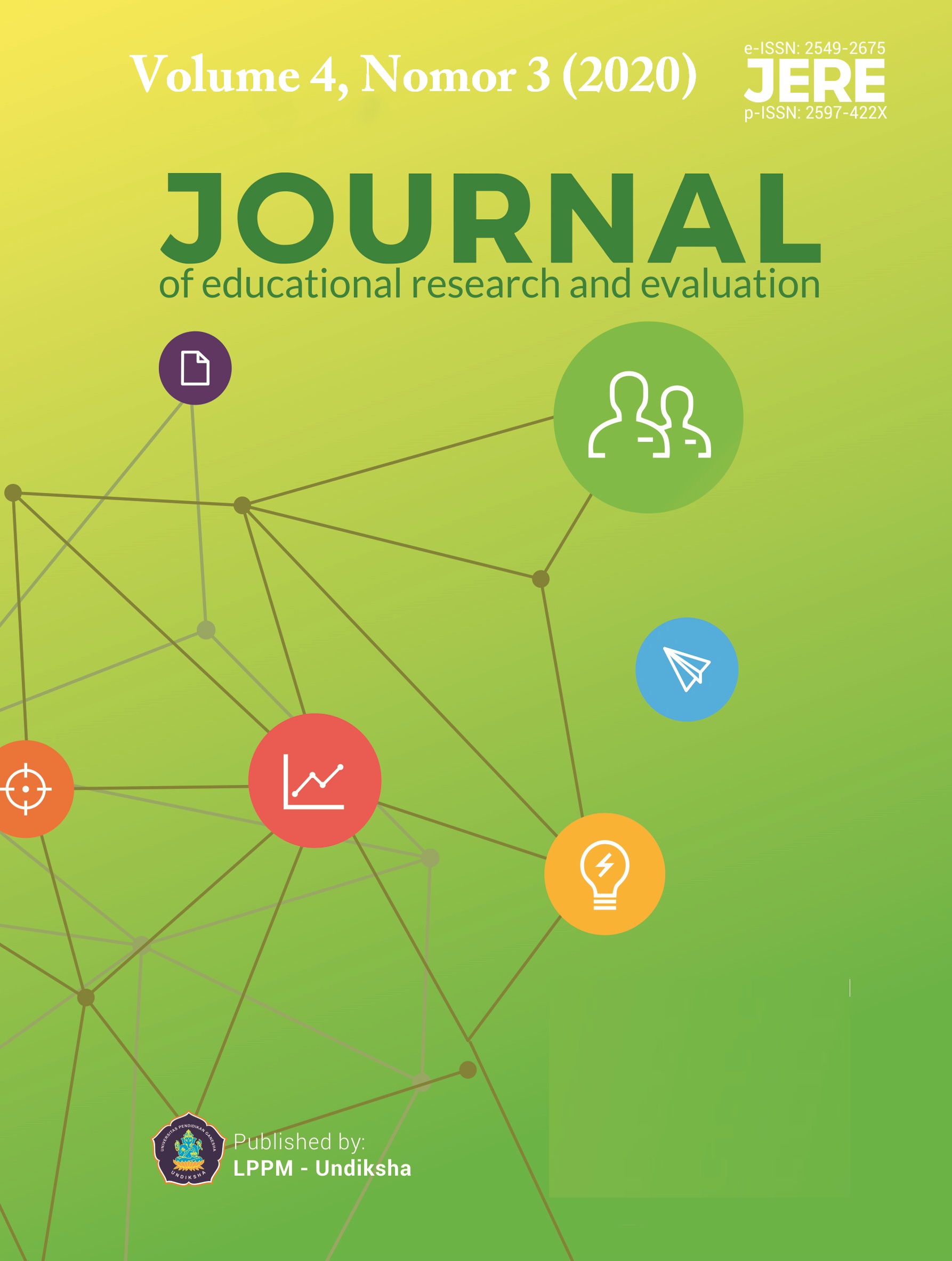Maximizing the Implementation of Scientific Approach in History Lessons Through Student-Centered Learning Model
DOI:
https://doi.org/10.23887/jere.v4i3.27482Keywords:
scientific approach, history, curriculum 2013Abstract
Curriculum changes and developments occur along with the development of educational theory and technological developments. These changes aim to improve the quality of education of Indonesia's human resources. The 2013 curriculum emphasizes the learning process using a scientific approach. The purpose of this study was to analyze the scientific approach in the 2013 curriculum in the implementation of history learning. The type of research used was a qualitative approach. This research was conducted at SMA Negeri 1 Babat Toman Musi Banyuasin. In this study, data were collected using observation, interviews, and document study method. Descriptive data analysis was used in this study. The results of this study indicate that the implementation of history learning in 2013 curriculum that uses a scientific approach through the Student-Centered Learning model and authentic assessment with 5 M (observing, asking questions, collecting data, associating, communicating) maximize learning by following the 2013 curriculum development. This study as a reference material to maximize other subject in accordance with 2013 curriculum development.
References
Antika, R. R. (2014). Proses Pembelajaran Berbasis Student Centered Learning (Studi Deskriptif di SMP Islam Baitul ‘Izzah, Nganjuk). Jurnal Biokultur, 3(1), 251–265. http://www.journal.unair.ac.id/download-fullpapers-bk21a95d451ffull.pdf.
Dewi, P. S. (2016). Kemampuan Proses Sains Siswa Melalui Pendekatan Saintifik Dalam Pembelajaran IPA Terpadu Pada Tema Global Warming. Edusains, 8(1), 18–26. https://doi.org/10.15408/es.v8i1.1564
Diani, R. (2016). Pengaruh pendekatan saintifik berbantukan LKS terhadap hasil belajar fisika peserta didik Kelas XI SMA Perintis 1 Bandar Lampung. Jurnal Ilmiah Pendidikan Fisika Al-Biruni, 5(1), 83–93. https://doi.org/10.24042/jpifalbiruni.v5i1.108
Elvianto, S., Nursaid, N., & Zulfikarni, Z. (2018). Penerapan Pendekatan Saintifik Pada Aspek Penilaian Dalam Pembelajaran Teks Negosiasi Di Kelas X Smk Muhammadiyah 1 Padang. Jurnal Pendidikan Bahasa Indonesia, 7(1), 230–238. https://doi.org/10.24036/9566-019883
Harahap, N. A., Ummah, K., Rohanawati, A. N., & Mardhatillah, S. R. (2020). Pengembangan model pembelajaran Student Center Learning (SCL) berbasis aktivitas pada mata kuliah Pendidikan Pancasila di Fakultas Hukum. Refleksi Pembelajaran Inovatif, 1(2). https://doi.org/https://doi.org/10.20885/rpi.vol1.iss2.art8
Horohiung, V. (2017). Pengaruh Strategi Pembelajaran dan Kemampuan Berpikir Kritis Terhadap Hasil Belajar Sejarah Siswa SMA Negeri 72 Jakarta. Jurnal Pendidikan Sejarah, 6(1), 1–10. 10.21009/JPS.061.01
Hosnan, M. (2016). Pendekatan Saintifik dan Kontekstual dalam Pembelajaran Abad 21. Ghalia Indonesia.
Judi, H. M., & Sahari, N. (2013). Student Centered Learning in Statistics: Analysis of Systematic Review. Procedia-Social and Behavioral Sciences, 103, 844–851. https://doi.org/10.1016/j.sbspro.2013.10.406
Jumardi, J. (2017). Peranan Pelajaran Sejarah Dalam Pengembangan Karakter Siswa melalui Pembelajaran Berbasis Nilai Sejarah Lokal di SMA Negeri 65 Jakarta Barat. Jurnal Pendidikan Sejarah, 6(2), 70–80. https://doi.org/10.21009/JPS.062.08
Moleong, J. (2017). Metodologi Penelitian Kualitatif. Pt Remaja Rosdakarya.
Mulyasa, E. (2014). Pengembangan dan Implementasi Kurikulum 2013 (5th ed.). Pt Remaja Rosdakarya.
Nazir, M. (1988). Metode Penelitian. Ghalia Indonesia.
Oemar, H. (2011). Kurikulum dan Pembelajaran. Bumi Aksara.
Permatasari, E. A. (2014). Implementasi pendekatan saintifik dalam kurikulum 2013 pada pembelajaran sejarah. Indonesian Journal of History Education, 3(1). https://journal.unnes.ac.id/sju/index.php/ijhe/article/view/3884
Prasetyawati, P. (2016). Analisis Proses Pembelajaran Berbasis Student Centered Learning Dalam Pendekatan Saintifik Pada Mata Pelajaran Sejarah Di SMA Negeri Se Kota Palu. Katalogis, 4(10), 130–137. http://jurnal.untad.ac.id/jurnal/index.php/Katalogis/article/view/7010
Sadikin, M. (2017). Analisis Pembelajaran Sejarah dengan Pendekatan Saintifik pada Kurikulum 2013. Sosial Horizon: Jurnal Pendidikan Sosial, 4(2), 219–227. https://doi.org/10.31571/sosial.v4i2.660
Sanjaya, W. (2006). Strategi Pembelajaran: Berorientasi Standar Proses Pendidikan. Kencana Prenada Media Group.
Siradj, Y. (2014). Implementasi SCL (Student Centered Learning) Pada Pembelajaran Kuliah Jaringan Komputer (Studi Kasus: Politeknik Telkom). Parameter, 24(1), 100–112. https://doi.org/10.21009/parameter.241.02
Sudarsana, I. K. (2018). Optimalisasi Penggunaan Teknologi Dalam Implementasi Kurikulum Di Sekolah (Persepektif Teori Konstruktivisme). Cetta: Jurnal Ilmu Pendidikan, 1(1), 8–15. http://jayapanguspress.penerbit.org/index.php/cetta/article/view/41
Sugiyono. (2011). Metode Penelitian Kuantitatif, Kualitatif, dan R&D. Alfabeta.
Suprihatin, S. (2015). Upaya Guru Dalam Meningkatkan Motivasi Belajar Siswa. Jurnal Pendidikan Ekonomi UM Metro, 3(1), 73–82. https://doi.org/10.24127/ja.v3i1.144
Susilana, R., & Heli, I. (2014). Pendekatan saintifik dalam implementasi kurikulum 2013 berdasarkan kajian teori psikologi belajar. Edutech, 13(2), 183–193. https://doi.org/10.17509/edutech.v13i2.3095
Sutarto. (2013). Kurikulum dan pembelajaran dalam Implementasi pada Kurikulum 2013. CV. Kemilau Ilmu Semesta.
Taçman, M., & Menteş, R. (2010). A qualitative research on teacher’s in the TRNC towards the situation on learning the usage of student centred education. Procedia - Social and Behavioral Sciences, 9, 2062–2068. https://doi.org/10.1016/j.sbspro.2010.12.447
Ulhaq, Z., Nuriah, T., & Winarsih, M. (2017). Pembelajaran Sejarah Berbasis Kurikulum 2013 di SMA Kotamadya Jakarta Timur. Jurnal Pendidikan Sejarah.
Umar, M. A. (2016). Penerapan Pendekatan Saintifik dengan Menggunakan Metode Pembelajaran Berbasis Proyek (Project-Based Learning) pada Mata Pelajaran Kimia. Jambura Journal of Educational Chemistry, 11(2), 132–138.
Unin, N., & Bearing, P. (2016). Brainstorming as a Way to Approach Student-centered Learning in the ESL Classroom. Procedia - Social and Behavioral Sciences, 224(15), 605–612. https://doi.org/10.1016/j.sbspro.2016.05.450
Uslan, U., & Nuriyah, N. (2018). Model Student Centered Learning (SCL) di Sekolah Dasar (SD) yang Inovatif Terintegrasi Pembelajaran Terpadu. PENDAS MAHAKAM: Jurnal Pendidikan Dasar, 3(1), 63–67. https://jurnal.fkip-uwgm.ac.id/index.php/pendasmahakam/article/view/225
Wildan, W. (2017). Pelaksanaan Penilaian Autentik Aspek Pengetahuan, Sikap dan Keterampilan di Sekolah atau Madrasah. Jurnal Tatsqif, 15(2), 131–153. https://doi.org/10.20414/jtq.v15i2.3
Downloads
Published
How to Cite
Issue
Section
License
Authors who publish with the Journal of Evaluation and Research in Education (JERE) agree to the following terms:
- Authors retain copyright and grant the journal the right of first publication with the work simultaneously licensed under a Creative Commons Attribution License (CC BY-SA 4.0) that allows others to share the work with an acknowledgment of the work's authorship and initial publication in this journal.
- Authors are able to enter into separate, additional contractual arrangements for the non-exclusive distribution of the journal's published version of the work (e.g., post it to an institutional repository or publish it in a book), with an acknowledgment of its initial publication in this journal.
- Authors are permitted and encouraged to post their work online (e.g., in institutional repositories or on their website) prior to and during the submission process, as it can lead to productive exchanges, as well as earlier and greater citation of published work. (See The Effect of Open Access)











